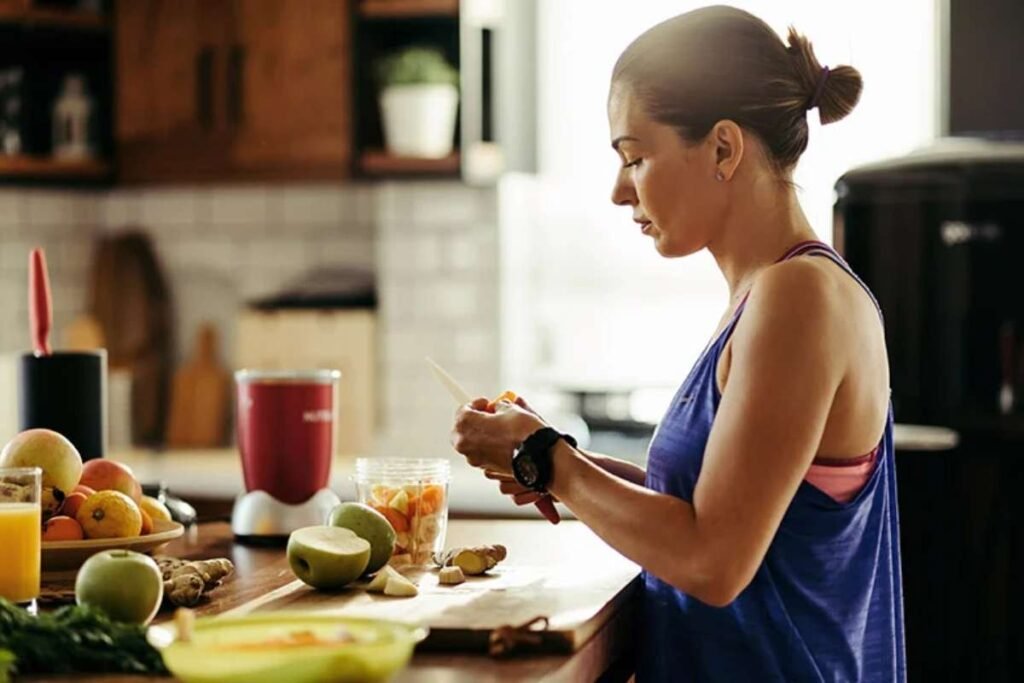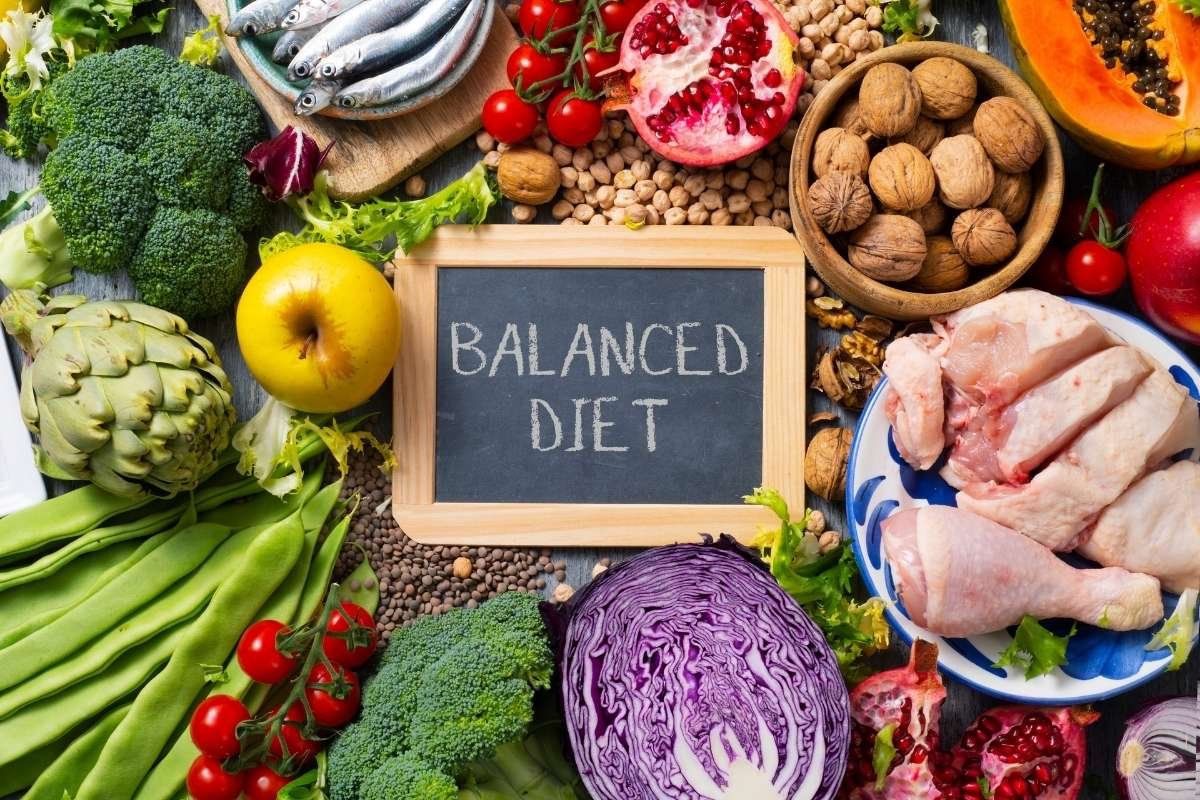Ever wonder why some athletes seem to have endless energy while others tire out too soon? The secret might lie in their nutrition and the foods that they consume. The right diet for athletes provides energy, builds endurance, and speeds up recovery after intense workouts.
It’s about striking the perfect balance between carbohydrates, proteins, fats, and hydration to meet the body’s high demands. Whether it’s a sprinter, swimmer, or football player, eating smart helps athletes push limits, stay strong, and perform consistently.
What is the Connection between Nutrition and Athletes?
Nutrition fuels every movement an athlete makes. It provides the energy to train longer, recover faster, and perform at peak levels. A proper diet for athletes supports muscle growth, improves endurance, and reduces fatigue. Without balanced nutrition, even the most talented athlete can struggle to reach their goals.
A healthy diet provides the right mix of carbohydrates, proteins, and fats. Carbohydrates supply energy, protein repairs muscle, and healthy fats aid recovery and hormone balance. Vitamins and minerals also help with oxygen flow, bone strength, and hydration. Each athlete’s body demands different levels of nutrients, depending on their sport and training intensity.
How Does a Diet for Athletes Differ according to Their Types?
Every athlete’s body works differently. The food that fuels a professional sprinter won’t suit a weekend runner or a Paralympic swimmer. That’s why their nutrition depends on their training level, goals, and recovery needs. Below, we explore what each type of athlete should eat, why these foods matter, and how a balanced plan can power their best performance. One thing to note is that the number of calories, carbs, and protein mentioned can vary according to the sport being played.
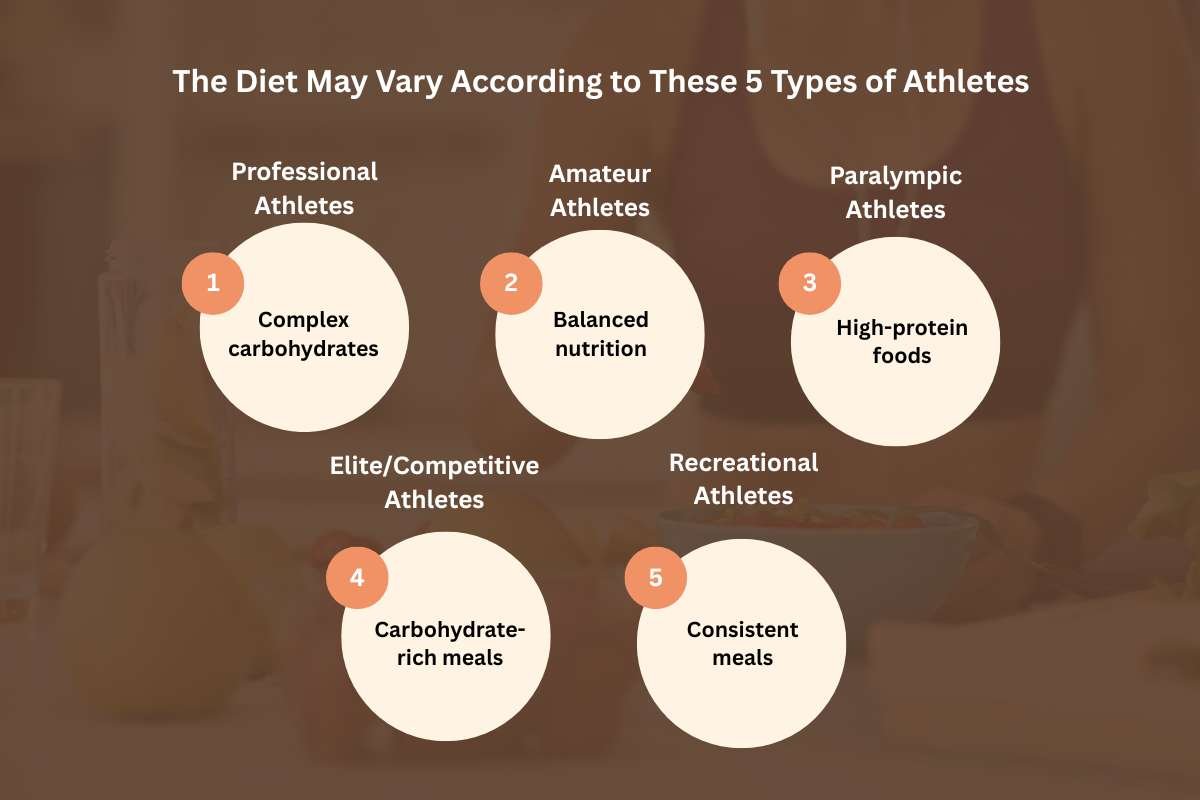
1. Professional Athletes
Calorie Needs: 3,000–5,000 kcal per day (varies by sport and body size).
Carbohydrates: 6–10 g per kg of body weight daily.
Protein: 1.6–2.2 g per kg of body weight daily.
Professional athletes train almost daily and push their bodies to high limits. Their diet for athletes must support heavy workouts and quick recovery.
Their diet should include complex carbohydrates like brown rice, oats, quinoa, and sweet potatoes. These supply long-lasting energy. Lean proteins such as chicken, fish, eggs, and tofu help repair muscles and improve strength. Healthy fats from nuts, olive oil, and avocados support joint health and hormone function. Fresh fruits and vegetables provide essential vitamins and antioxidants that reduce muscle soreness.
These foods help maintain steady energy, repair micro-tears in muscle fibers, and prevent fatigue. Carbohydrates refuel glycogen stores, while proteins speed up recovery. Proper fat intake keeps inflammation under control and boosts overall endurance.
Meal Plan for Professional Athletes:
| Meal | Food | Purpose |
| Breakfast | Oatmeal with bananas and almonds | Provides complex carbs and healthy fats |
| Mid-Morning Snack | Greek yogurt with berries | Adds protein and antioxidants |
| Lunch | Grilled chicken, quinoa, and steamed broccoli | Balances carbs, protein, and fiber |
| Evening Snack | Protein shake with a banana | Helps muscle recovery |
| Dinner | Baked salmon, brown rice, and spinach | Refuels and supports repair overnight |
2. Amateur Athletes
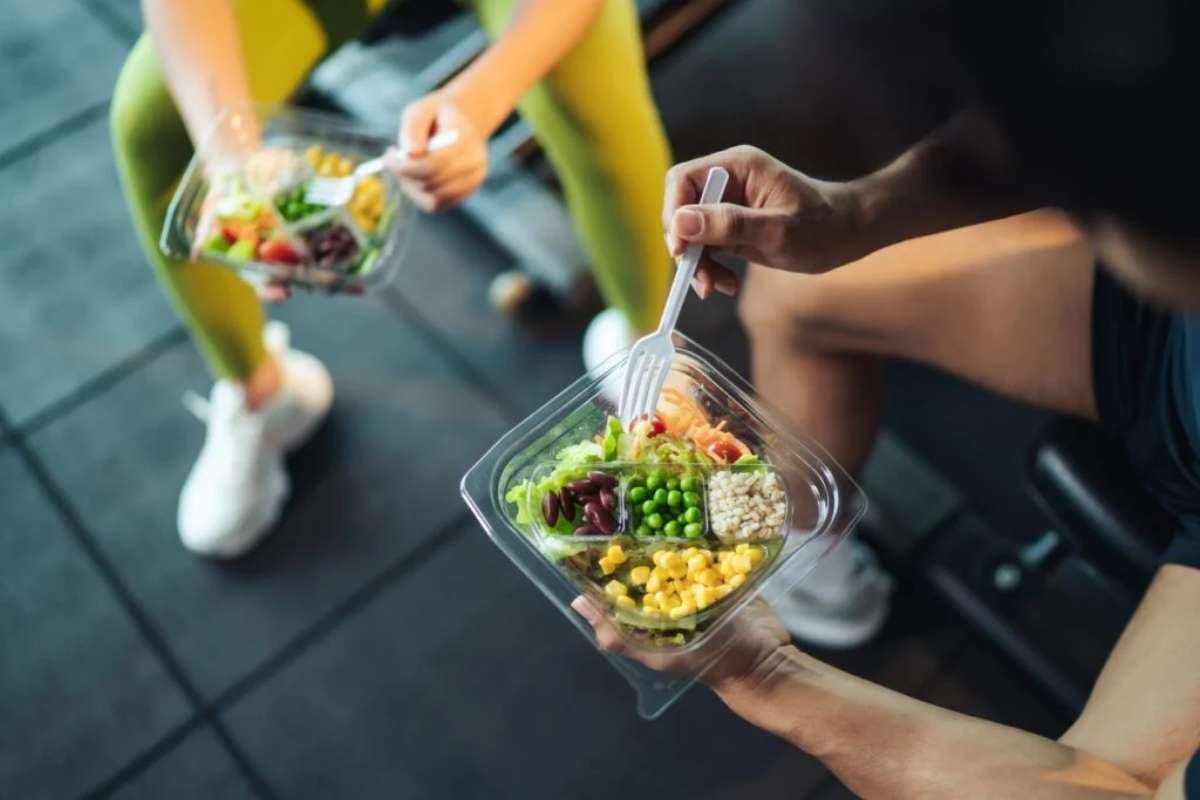
Calorie Needs: 2,200–3,000 kcal per day.
Carbohydrates: 5–7 g per kg of body weight daily.
Protein: 1.2–1.6 g per kg of body weight daily.
Amateur athletes train regularly but not at the intensity of professionals. They must target balanced nutrition, but their portion sizes and calorie intake can be lower.
The diet for athletes like these must contain a balanced mix of whole grains, fruits, lean meats, and low-fat dairy works well. They can add beans, lentils, and nuts for extra protein and fiber. Smoothies made with milk or yogurt are great for a quick energy boost before or after workouts.
These foods support gradual muscle development and consistent energy levels. They also help with recovery and improve stamina over time. Whole grains and fruits provide natural sugars that energize the body without processed ingredients.
Meal Plan for Amateur Athletes:
| Meal | Food | Purpose |
| Breakfast | Whole-grain toast with peanut butter and apple slices | Combines carbs and healthy fats |
| Mid-Morning Snack | Cottage cheese with pineapple | Adds protein and simple sugars |
| Lunch | Turkey sandwich with mixed greens and whole-grain bread | Provides lean protein and fiber |
| Snack | Banana and a handful of almonds | Boosts energy before workouts |
| Dinner | Grilled fish, mashed sweet potatoes, and green beans | Supports recovery and muscle repair |
3. Paralympic Athletes
Calorie Needs: 1,800–3,200 kcal per day (depending on sport and energy use).
Carbohydrates: 4–7 g per kg of body weight daily.
Protein: 1.6–2.0 g per kg of body weight daily.
Paralympic athletes require tailored diets to match their sport type, metabolism, and energy expenditure. The diet for athletes in this group focuses on improving strength, endurance, and recovery while considering any physical limitations.
High-protein foods like eggs, fish, and lean meats help maintain muscle mass. Whole grains provide steady energy for long training sessions. Colorful vegetables offer antioxidants that aid tissue repair, while calcium-rich foods like yogurt and spinach support bone health.
Many Paralympic athletes have unique physical demands, so nutrient timing is essential. Balanced meals stabilize energy levels and prevent fatigue during long events. A higher protein intake also helps counter muscle loss from reduced mobility.
Meal Plan for Paralympic Athletes:
| Meal | Food | Purpose |
| Breakfast | Scrambled eggs with whole-grain toast and orange juice | Offers protein and vitamin C |
| Snack | Protein bar or smoothie | Supports mid-morning energy |
| Lunch | Grilled tofu, quinoa, and roasted vegetables | Plant-based protein for strength |
| Snack | Low-fat yogurt with berries | Aids digestion and recovery |
| Dinner | Chicken stir-fry with brown rice and carrots | Provides a balance of nutrients |
4. Elite/Competitive Athletes
Calorie Needs: 3,500–6,000 kcal per day.
Carbohydrates: 7–12 g per kg of body weight daily (especially during competition season).
Protein: 1.6–2.2 g per kg of body weight daily.
Elite athletes compete at the highest levels and follow strict routines. They depend on carb-loading meals like pasta, rice, oats, and fruits before competitions. Protein sources like fish, chicken, and soy maintain muscle tone. Hydrating foods such as cucumbers, oranges, and soups help replace lost fluids. They also use sports drinks to restore electrolytes.
During competition, the body uses a large amount of glycogen. Carbohydrate-rich meals refill those stores. Protein supports lean muscle and aids recovery. Hydrating foods and drinks prevent cramps and dehydration. Hence, the diet for athletes who play at a competitive level must maximize energy and support fast recovery between intense sessions.
Meal Plan for Competitive Athletes:
| Meal | Food | Purpose |
| Breakfast | Whole-grain pancakes with berries and honey | Provides energy for training |
| Snack | Banana and peanut butter smoothie | Adds quick carbs and protein |
| Lunch | Grilled chicken, rice, and green salad | Refuels glycogen and adds micronutrients |
| Snack | Energy bar and electrolyte drink | Maintains hydration and focus |
| Dinner | Pasta with tomato sauce and lean beef | Prepares the body for competition |
5. Recreational Athletes
Calorie Needs: 1,800–2,500 kcal per day.
Carbohydrates: 3–5 g per kg of body weight daily.
Protein: 1.0–1.4 g per kg of body weight daily.
Recreational athletes exercise for fitness and enjoyment. Fruits and vegetables should fill half the plate. Whole grains like brown rice, oats, and millet provide energy, while lean proteins such as eggs, beans, or chicken can support recovery. A small portion of healthy fats from olive oil or nuts keeps the diet balanced.
A diet for athletes who participate in sports for fun must support regular activity without excess calories. They promote steady energy, strong bones, and muscle repair. Consistent meals also prevent fatigue and improve concentration during workouts.
Meal Plan for Recreational Athletes
| Meal | Food | Purpose |
| Breakfast | Fruit smoothie with oats and yogurt | Combines carbs and protein |
| Snack | Apple with a handful of walnuts | Adds fiber and healthy fats |
| Lunch | Grilled chicken salad with olive oil dressing | Provides lean protein and greens |
| Snack | Hummus with whole-grain crackers | Supplies plant protein |
| Dinner | Vegetable stir-fry with brown rice | Maintains energy balance |
Hydration for Athletes
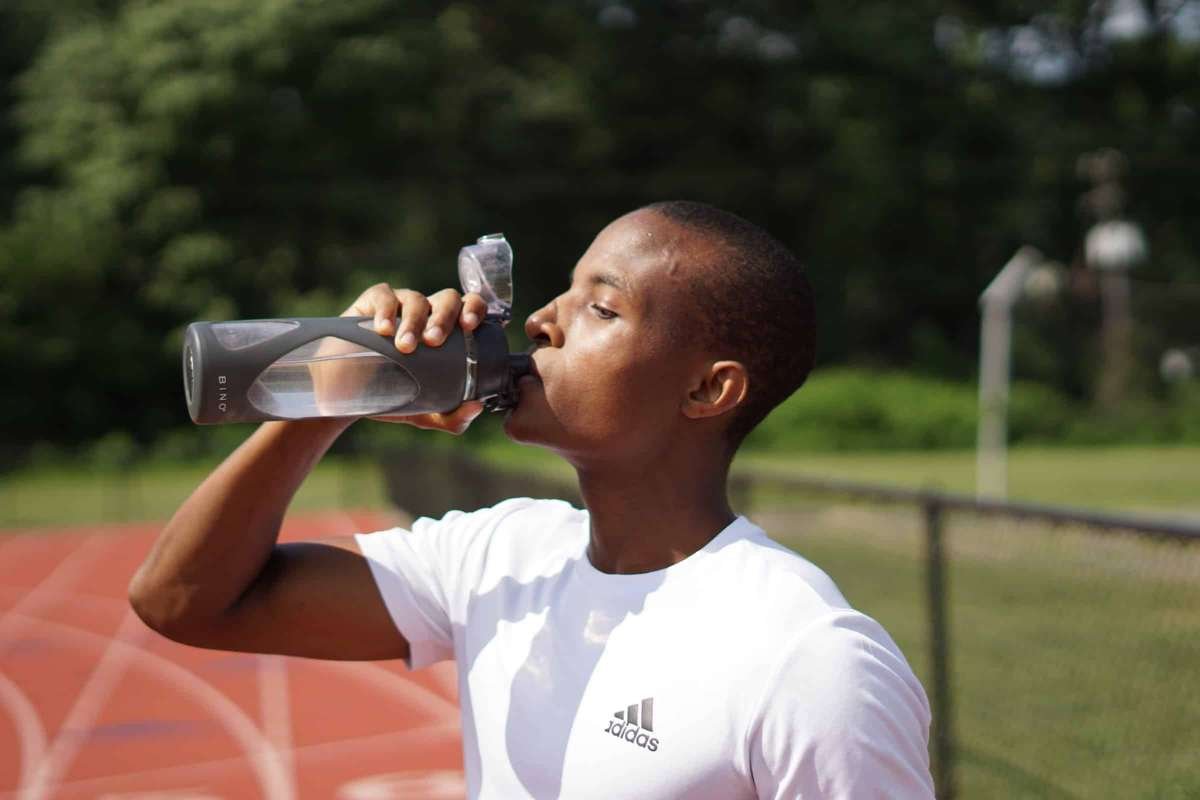
Hydration is as vital as food. The right diet for athletes always includes a hydration plan. Water regulates body temperature and prevents cramps, while electrolytes keep muscles functioning properly.
Athletes should drink water before, during, and after training. For sessions lasting over an hour, sports drinks with sodium and potassium help replace lost minerals. Coconut water is also a natural option. A general rule is to drink 500 ml of water two hours before exercise and sip small amounts throughout.
The key to proper hydration is listening to your body. A recent study published in the Journal of Nutrients (2024) found that tailoring hydration to individual sweat and sodium loss can boost performance by 40% and significantly reduce dehydration during intense exercise in heat.
Dehydration slows reaction times and reduces strength. Clear or pale-yellow urine often means you’re hydrated, while dark urine signals dehydration.
Things to Consider When Creating a Diet for Athletes
Creating a successful diet depends on more than just calories. Several key factors should be considered when creating a nutrition plan:
- Type of sport: Endurance sports like marathon running need more carbs, while strength sports like weightlifting need more protein.
- Training intensity: More intense training means higher calorie needs.
- Age and gender: Metabolism and recovery speed vary with age and gender.
- Body composition goals: Some athletes aim to build muscle, others to maintain or reduce weight.
- Timing of meals: Eating small meals every 3–4 hours helps sustain energy and recovery.
- Rest and recovery: Proper sleep and rest allow nutrients to work effectively.
Customizing these elements helps athletes maintain top performance while avoiding fatigue or overtraining.
Foods that Athletes Should Avoid
Even the best diet for athletes can fail if unhealthy foods are part of it. Certain items slow recovery or harm endurance. Avoiding them keeps performance sharp and energy steady.
- Processed foods: Chips, instant noodles, and sugary snacks cause energy crashes.
- Sugary drinks: Soda and energy drinks dehydrate the body.
- Fried foods: They add unhealthy fats and slow digestion.
- Excessive caffeine: Too much can increase heart rate and cause dehydration.
- Alcohol: It slows recovery and affects sleep quality.
- High-fat desserts: Ice cream or pastries add empty calories without nutrients.
Athletes should focus on whole, natural foods instead. Balanced meals and proper hydration together create a solid foundation for endurance, focus, and strength.
Conclusion
At the end of the day, training alone doesn’t define an athlete’s success; nutrition does too. A balanced diet for athletes gives the body what it needs to perform, recover, and grow stronger over time. From proteins that rebuild muscles to carbs that refuel energy, every meal plays a role in progress. When athletes understand and respect the power of proper nutrition, they can unlock their body’s full potential, one plate at a time.
FAQs
1. What should be included in a balanced diet for athletes?
A balanced diet should include lean proteins, complex carbohydrates, healthy fats, fruits, vegetables, and plenty of water. These nutrients support energy, muscle repair, and overall recovery.
2. How important is hydration for athletes?
Hydration is critical. Dehydration can reduce performance, increase fatigue, and slow recovery. Athletes should drink water before, during, and after workouts to maintain optimal performance.
3. Can a vegetarian diet work for athletes?
Yes. A vegetarian diet for athletes can be just as effective if it includes enough protein sources like lentils, tofu, beans, nuts, and whole grains.
Also Read :

